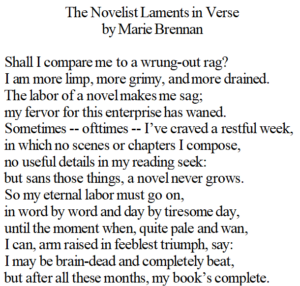I think I’ve suddenly become an evangelist for figures of speech.
During a recent poetry challenge in the Codex Writers’ Group, someone recommended two books on the topic: The Elements of Eloquence: Secrets of the Perfect Turn of Phrase by Mark Forsyth, and Figures of Speech: 60 Ways to Turn a Phrase by Arthur Quinn. I found both delightfully readable, in their different stylistic ways, and also they convinced me of what Forsyth argues early on, which is that it’s a shame we’ve almost completely stopped teaching these things. We haven’t stopped using them; we’re just doing so more randomly, on instinct, without knowing what tools are in our hands.
What do I mean when I say “figures of speech”? The list is eighty-seven miles long, and even people who study this topic don’t always agree on which term applies where. But I like Quinn’s attempt at a general definition, which is simply “an intended deviation from ordinary usage.” A few types are commonly recognized, like alliteration or metaphor; a few others I recall cropping up in my English classes, like synecdoche (using part of a thing to refer to a whole: “get your ass over here” presumably summons the whole body, not just the posterior). One or two I actually learned in Latin class instead — that being a language that can go to town on chiasmus (mirrored structure) because it doesn’t rely on word order to make sense of a sentence. (“Ask not what your country can do for you, but what you can do for your country”: English can do it, too, just a bit more loosely.) Others were wholly new to me — but only in the sense that I didn’t know there was a name for that, not that I’d never heard it in action. Things like anadiplosis (repeating the end of one clause at the beginning of the next: “Fear leads to anger. Anger leads to hate. Hate leads to suffering.”) or anastrophe (placing an adjective after the noun it modifies: “the hero victorious” or “treason, pure and simple”)*.
*Before you comment to say I’m using any of these terms wrong, refer to the above comment about specialists disagreeing. That anastrophe might be hyperbaton instead, or maybe anastrophe refers to more than just that one type of rearranging, or or or. Whatever.
Quinn’s book is the older one (written in the early ’80s), and something like two-thirds of his examples are from Shakespeare or the Bible. On this front I have to applaud Forsyth more energetically, because he proves his point about how these things aren’t irrelevant to modern English by quoting examples from sources like Katy Perry or Sting. (The chorus of “Hot n Cold” demonstrates antithesis; the verses of “Every Breath You Take” are periodic sentences, i.e. they build tension by stringing you out for a long time before delivering the necessary grammatical closure.) And when you get down to it, a ton of what the internet has done to the English language actually falls into some of these categories; the intentionally wrong grammar of “I can haz cheeseburger” is enallage at work — not that most of us would call it that.
But Quinn delivers an excellent argument for why it’s worth taking some time to study these things. He doesn’t think there’s much value in memorizing a long list of technical terms or arguing over whether a certain line qualifies as an example — which, of course, is how this stuff often used to be taught, back when it was. Instead he says, “The figures have done their work when they have made richer the choices [the writer] perceives.” And that’s why I’ve kind of turned into an evangelist for this idea: as I read both books, I kept on recognizing what they were describing in my own writing, or in the memorable lines of others, and it heightened my awareness of how I can use these tools more deliberately. Both authors point out that sentiments which might seem commonplace if phrased directly acquire impact when phrased more artfully; “there’s no there there” is catchier than “Nothing ever happens there,” and “Bond. James Bond.” took a name Fleming selected to be as dull as possible and made it iconic. And it brought home to me why there’s a type of free verse I find completely uninteresting, because it uses none of these things: the author has a thought, says it, and is done, without any intended deviations from ordinary usage apart from some line breaks. At that point, the poem lives or dies entirely on the power of its idea, and most of the ones I bounce off aren’t saying anything particularly profound.
So, yeah. I’m kinda burbling about a new obsession here, and no doubt several of you are giving me a sideways look of “ummm, okay then.” But if you find this at all interesting, then I recommend both books as entertaining and accessible entry points to the wild jungle of two thousand years of people disagreeing over their terms.






